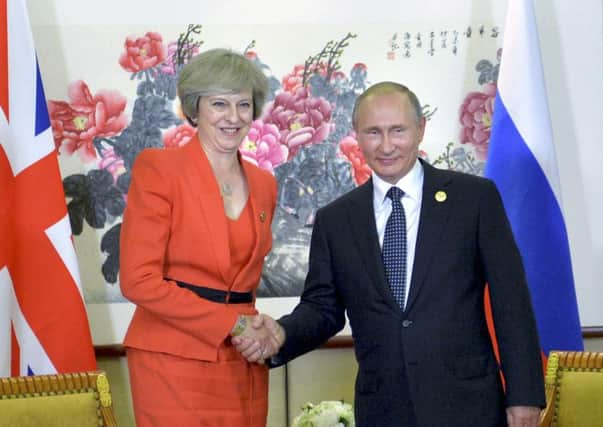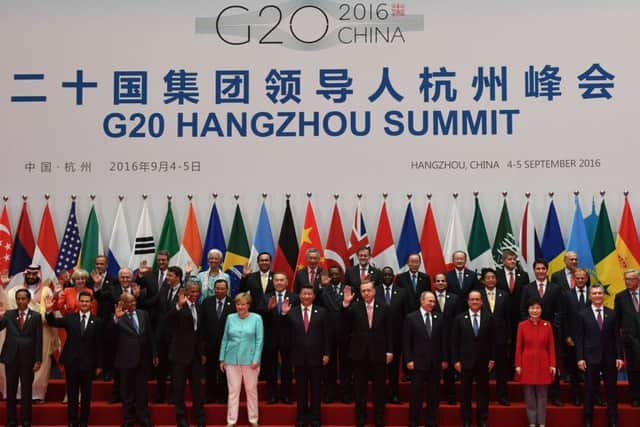Theresa May: Scots don't want another Indyref


In her first major interview, the Prime Minister did not rule out blocking a second independence vote, but said the issue wasn’t if another independence referendum could happen, but whether it should be called at all.
Her comments will put further pressure on Nicola Sturgeon, who launched a “listening exercise” last week as polls showed the shock of Brexit has not increased the appetite for independence.
Advertisement
Hide AdAdvertisement
Hide Ad“The people of the United Kingdom took a decision to leave the European Union,” Mrs May said on the BBC’s Andrew Marr programme yesterday.


“What I want to do is make a success of it. What I would say to the people in Scotland is I want to ensure that that’s a success for people in Scotland.”
Asked if she would refuse permission for a second independence referendum, the Prime Minister said: “I don’t think it’s a question of whether there could be a second referendum, it’s whether there should be a second referendum.”
She later added: “I think if you look at some of the results that are now coming out of polling in Scotland, they suggest that the Scottish people don’t want there to be a second referendum.”
The Prime Minister also confirmed she would not be calling an election before 2020.


She said: “I’m not going to be calling a snap election. I’ve been very clear that I think we need that period of time, that stability to be able to deal with the issues that the country is facing and have that election in 2020.”
Mrs May also revealed that David Davis, the secretary of state for exiting the EU, will update the House of Commons on work to prepare for Brexit negotiations when MPs return today following the summer recess.
The interview, recorded before Mrs May left for the G20 summit in China, was broadcast as attempts to convince world leaders that the UK remained reliable partner were dealt a series of blows.
Advertisement
Hide AdAdvertisement
Hide AdUS president Barack Obama said a trade deal with the UK was not his country’s top priority, while the Japanese government released a detailed warning of the damage Brexit could do to manufacturing and direct investment.
Mr Obama stuck by his warning given before the EU referendum that the UK would be “at the back of the queue” in search of a trade deal, saying that America’s priority was the Trans-Pacific Partnership and the troubled US-EU deal.
“We are going to do everything we can to make sure that the consequences of the decision don’t end up unravelling what is a very strong and robust economic relationship and could become even stronger in the future,” the US president said following one-on-one talks with Mrs May yesterday morning. “But, first things first.”
However, the two leaders insisted the “Special Relationship” the UK and the US would endure regardless of Brexit, and would “grow stronger with time”.
Mr Obama said: “Even as the UK pursues an orderly exit from the EU, together we reaffirm the very special relationship between the United States and the United Kingdom.
“It will not simply endure, but it will continue to grow stronger with time. The vibrant economic partnership between our countries will continue, as the UK gains further clarity on its new relationship with the EU.”
Mr Obama said the two countries would discuss ways in which to “sustain and strengthen our trade and investment ties”, and he praised the Prime Minister as a “steadying influence during a time of transition”.
Mrs May said both leaders are “strong supporters of free trade” and said discussions had focused on “taking forward consultations to ensure that the UK and US have the strongest possible trading relationship.”
Advertisement
Hide AdAdvertisement
Hide AdThe Prime Minister faces a difficult meeting with Chinese president Xi Jinping today, with the issue of a nuclear deal put on hold by Mrs May looming over their first encounter.
Shadow Europe secretary Barry Gardiner said: “President Obama’s comments are a firm reminder that the US is realigning their future economic priorities with the Asian ‘tiger economies’.
“Any hope that a trade deal with us would be concluded quickly must be reassessed taking account of that stark reality. Trade deals take time and resources and the US has already committed to making a success of the Trans-Pacific Partnership and TTIP.
“Our primary trade negotiations must be with the EU as the first question other prospective trade partners want answered is where does the UK now stand with the world’s largest single market.”
Tom Brake, the Liberal Democrats’ foreign affairs spokesman, claimed that under Mrs May “Britain has not stood so alone for three-quarters of a century”.
He said: “At the G20 summit she is not holding a single bi-lateral meeting with another EU leader. The Conservatives have left us with no friends in Europe, and now they have damaged our friendship with America.”
A Downing Street official said of Mr Obama: “He is a president who has invested a lot of time in multilateral trade deals, that sees those as kind of his legacy and has wanted to get those over the line.
“So I don’t think him talking up those, and the focus and efforts that the US has put into those, is that much of a surprise, really.
“If you look at the timescales of the UK negotiating a trade deal and you look at the timescale before there will be a new US president, I wouldn’t over-read his views.”